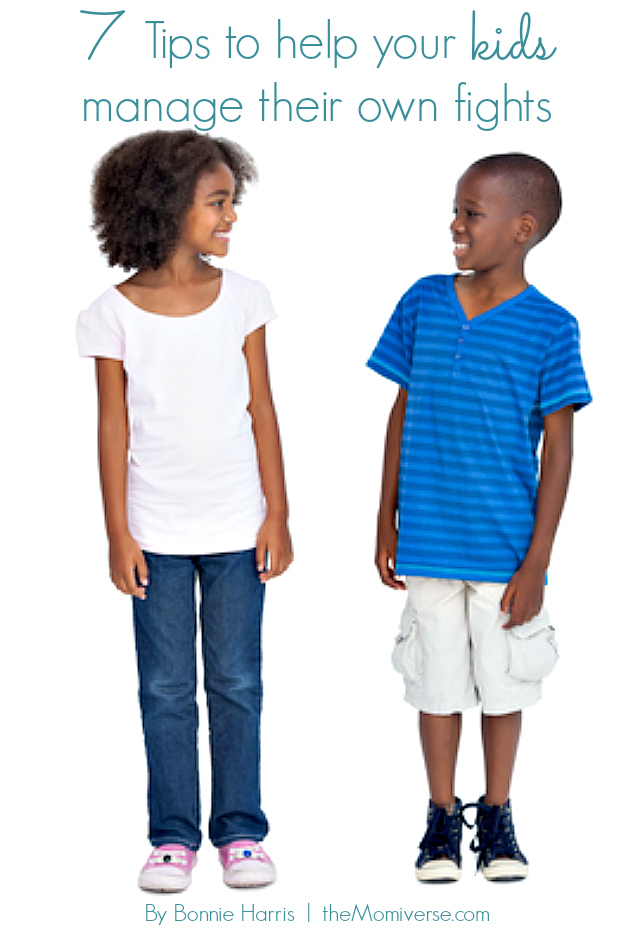In parenting, there aren’t many experiences more time consuming, frustrating, worrisome, and annoying than your children’s fights. In a nanosecond, you fear they’ll never have any meaningful relationships of any kind. You don’t know what to do to change their constant fighting; you yell at their behavior; and maybe you send one or both children to their rooms. But it starts all over again.
The drain on a parent’s psyche is palpable.
Let’s go through the process and make some changes that will get you out of the fray and give your children important life-long skills.
Sibling fights and a parent’s reaction
You hear the inevitable argument coming from the other room. You immediately fall into step:
- You think, “When will this ever end, I can’t stand this fighting. Why can’t things ever be peaceful?” You assume, “They’re going to grow up hating each other. Why can’t I teach
- them to get along? I don’t know how to handle this. I have to stop it.”
- You intervene, fearing bloodshed – or at least escalation, if you don’t stop it now.
- You say something like, “What’s going on? Why do you always have to fight? Who started it? You have to stop this now.”
- Your children tell you why the other one is at fault. They very adeptly make their case, give you evidence, and look to you to place the blame on the other one.
- One of your children may come running to you with stories about the crime the other child has committed.
Establish healthy boundaries
As a conscientious parent, you take on the responsibility to solve your children’s problem because:
- You fear they can’t do it themselves
- They’ll kill each other if you leave them to their own devices
- You dwell in The Triangle Zone (you at the tip and your kids on each corner of the base)
- It’s your job. Isn’t it?
No, it’s not your job to solve your children’s quarrels.
In so many parenting situations, it’s important to understand boundaries – what’s your problem and what isn’t. If it’s your problem to fix your children’s fights and teach them to get along, then who is to blame each time they fight? Yes. You. It’s exhausting. You’ve given yourself an impossible job.
Coach versus referee
Before handling the situation effectively, convince yourself that your children’s fight is their problem, not yours. That doesn’t mean you coldly wash your hands of it and walk away. Before they can manage their own problems, they need your help.
Your job is to be a coach, not a referee. Be objective, not judgmental. Surprisingly, it’s much more helpful to hand the problem over to them and relinquish responsibility for solving it.
If your children expect you to be the self-proclaimed referee, they also think you’re the judge and jury. In this scenario, your children do not learn any lessons. And because the child who’s in
more trouble tallies points against the other, you have unintentionally set up the next sibling fight.
Let go of the role of referee. Rather than getting your children to see it your way, let the process becomes about them. This allows you to show your trust in their capability to manage problems and they learn they are trustworthy and capable.
Try the following seven tips to help your kids manage their own fights:
- Wait at least two minutes longer than usual to enter the scene. It may feel like an eternity, but unless there’s bloodshed, your children might surprise you.
- If the fighting is very physical, place your body between them and yell, “STOP, everyone to your corner.” Have each of your children choose a corner for times like this. Wait until their emotions have cooled off before talking about it.
- If the fighting is verbal, your job as the coach is to turn the problem back to your children. Say, “You need to tell your sister that, not me.” “She needs to hear that. Tell her how you feel.”
- If you are faced with one child running to you, acknowledge the upset and tell her she needs to tell her sibling. If she needs your help, go with her and continue as above.
- Be a neutral observer. Guide your children, so they figure out how to solve their own problems. Be compassionate and understanding, not directing. “I can understand how that must feel hurtful. Make sure your brother understands that. What do you need to tell him?” Then say to the other child, “Yeah, I get how frustrating that must be. Tell your sister, not me. Ask her for what you want.”
- After they get used to this process, stick your head in the room and ask, “Is this fight okay with both of you?” or “I know you guys can work this out. Come and tell me what you decide.” Leave the room.
- Explain the rules of conflict resolution:
- Nobody loses
- No one gets in trouble
- Each person gets uninterrupted time to vent and state their problem (back and forth until they’re done)
- The solution must be agreed on by everyone
- Each person has an uninterrupted opportunity to express their feelings toward the other and say what they do and do not like and want.
- Everyone can suggest solutions – even parents. Write down all the suggestions and take them seriously.
- When you have a list of suggestions for a resolution, go over it together and cross out the suggestions that cannot be agreed on by everyone involved. If nothing is left, come back to it later.
Your goal is to one day hear from the other room, “Be quiet! Let’s work it out so Mom doesn’t come in and make us talk about it.”







{ 1 comment }
Nice article. Those who know how to make conflict creative have a clear shot at success and happiness. I would add: 1) establish the norm that conflict is not something to be “managed” or “resolved,” but an opportunity to build a relationship and collectively come up with something new that’s valuable. 2) coach each participant in the skills of getting to “Yes.”: a) separate the person from the problem, b) get beneath positions to interests, c) generate multiple options for mutual satisfaction (last two bullet points, d) use directly verifiable description, e) know your best move if it turns out you are dealing with a bully.
Important article. Thank you.